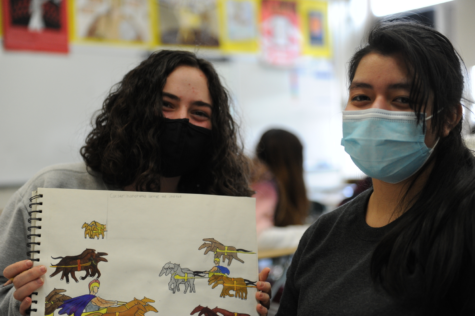Is the Latin Language Living?
After studying Latin for the past three years at Bronx Science, I feel qualified to dive into the question of whether or not the Latin language is indeed living.
Mr. Carli has been teaching Latin II, Regents Latin, and AP Latin here at Bronx Science for a while now. With his positive attitude and contagious energy, his students leave his class not only more knowledge in the Latin language, but with an eagerness to learn more.
“Et tu, Brute?” is a famous Latin phrase taken from Shakespeare’s play Julius Caesar. It is also my response to people when they ask me to say something in Latin.
Ninth graders at the Bronx High School of Science are required to choose a language to study for at least three years. Considering that I came from a middle school where I was taught three years of Spanish and was critiqued based on my lack of understanding, choosing a world language that did not require me to maintain a conversation felt like a blessing. Plus, who wouldn’t want to learn a “dead” language?
When my friends and family ask me to explain why I chose to study Latin instead of the many other popular languages taught, such as French or Italian, I cannot give them a straight answer. It varies from “I never heard of it before and was interested in learning it,” to “I read Percy Jackson and became obsessed with Greek mythology.” It is mostly the second one that slips out.
With my third and final year of learning Latin in high school coming to an end, I felt it was appropriate to commence a final goodbye. My usual complaints about Latin consist of how tedious the homework is (which usually involves translating a good portion of a text) and my lack of vocabulary knowledge required to understand the text. Despite these qualms, Latin class had its good moments. I got closer to the small group of classmates I have been with since my ninth grade year, felt the kindness of the two Latin teachers here at Bronx Science, Ms. Arcidiacono and Mr. Carli, and learned a language that is not widely studied.
The history of the Latin language is intriguing. The birth of the Latin language took place around 700 BC in a small settlement sloping up towards Palatine Hill. The speakers of this language were called Romans, named after their legendary founder, Romulus. Latin spread with the increase of Roman political power, first throughout Italy, then most of western and southern Europe, and the central and western Mediterranean coastal regions of Africa. During the Middle Ages and until comparatively recent times, Latin was the language most widely used in the West for scholarly and literary purposes. Until the latter part of the 20th century, it was even used in the services provided by the Roman Catholic Church.
The fall of the Roman Empire began a new era for the Latin language. It transformed first into a simplified version called Vulgar Latin, and then gradually into the Romance languages: Spanish, French, Italian, Portuguese, and Romanian. With this transformation, Classical Latin fell out of use.
The big question asked today is whether or not Latin is considered “dead.”
One argument is that Latin is not dead; it is a living language that slowly evolved over time. As a language of antiquity, it never quite went extinct.
People still speak, write, and learn Latin. As long as future generations find value in the language, it can never fully die. Cicero said it best: “The life of the dead is placed in the memory of the living.”

The Bronx High School of Science offers its own Latin Club, where students help keep the Latin language alive.

Some people believe that Latin is dead, or the true form of it at least. It evolved into other languages and forms, but classical Latin is dead because there are no more native speakers of the language.
A language is considered “living” when it evolves and is spoken on a day-to-day basis between people as a means of communication. This is a widespread argument of those who believe Latin is a dead language since it doesn’t change and adapt with time but is rather remembered. Examples of other dead languages are the ancient Egyptian language, Coptic, and Ancient Greek. While these languages can be studied today, there are no native speakers of these languages, nor are they spoken daily between people as a means of communication.
I personally believe that Latin is a dead language, but its influence is still present in modern times. There may be no more native speakers, but I have still been able to learn about Latin through its various texts. Even though I will miss the bonds that Latin created for me, I am glad that I get to end my experience on a high note.
I personally believe that Latin is a dead language, but its influence is still present in modern times.
Aaminah Bukhari is a Copy Chief for ‘The Science Survey.’ Her job is to edit her fellow peers’ articles to help them display their full writing potential....

